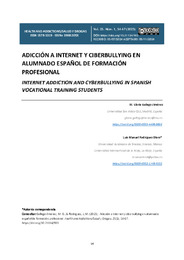Por favor, use este identificador para citar o enlazar este ítem:
https://hdl.handle.net/11000/35736
Adicción a Internet y ciberbullying en alumnado español de Formación Profesional
Título :
Adicción a Internet y ciberbullying en alumnado español de Formación Profesional |
Autor :
Gallego-Jiménez, M Gloria 
Rodríguez Otero, Luis Manuel  |
Editor :
Universidad Miguel Hernández |
Departamento:
Departamentos de la UMH::Psicología de la Salud |
Fecha de publicación:
2025 |
URI :
https://hdl.handle.net/11000/35736 |
Resumen :
Introducción. La incursión de internet ha generado un nuevo contexto de socialización y materialización del bullying. La adicción a internet refiere a la incapacidad para no utilizar o poner límites al uso de internet, a través de la pérdida de control ante su uso y dependencia. Método. Se planteó ... Ver más
Introduction. The incursion of the internet has generated a new context of socialization and materialization of bullying. Internet addiction refers to the inability not to use or set limits to the use of the Internet, through the loss of control over its use and dependence. Method. A non-experimental, descriptive-correlational design was used to analyze the relationship between Internet addiction, cyberbullying, and socio-demographic factors in Spanish Vocational Training students. Non-probabilistic convenience sampling was used to select a sample of 1.070 students from 13 educational centers in 6 Spanish Autonomous Communities from different areas. A self-administered questionnaire was applied, constructed from the Likert scale to assess Internet addiction and the Spanish version of the European Cyberbullying Intervention Project Questionnaire. For data analysis, parametric analyses were carried out and Pearson's correlation coefficient was calculated between the scales applied. Results. The results showed that the levels of internet addiction are high and the levels of cyberbullying are medium; Likewise, a positive correlation was identified between both scales. Conclusions.The development of emotional and social skills skills may appear as protective factors to prevent both internet addiction and cyberviolence.
|
Palabras clave/Materias:
Bullying
Internet
Cibervictimización
Ciberagresión
Formación Profesional
Cyber-victimization
Cyber-aggression
Vocational training |
Área de conocimiento :
CDU: Filosofía y psicología: Psicología |
Tipo de documento :
info:eu-repo/semantics/article |
Derechos de acceso:
info:eu-repo/semantics/openAccess
Attribution-NonCommercial-NoDerivatives 4.0 Internacional |
DOI :
https://doi.org/10.21134/903 |
Publicado en:
Health and addictions. Salud y drogas. |
Aparece en las colecciones:
Health and Addictions Journal/Salud y Drogas Vol. 25 Núm. 1 (2025)
|
 La licencia se describe como: Atribución-NonComercial-NoDerivada 4.0 Internacional.
La licencia se describe como: Atribución-NonComercial-NoDerivada 4.0 Internacional.
 La licencia se describe como: Atribución-NonComercial-NoDerivada 4.0 Internacional.
La licencia se describe como: Atribución-NonComercial-NoDerivada 4.0 Internacional.
.png)
